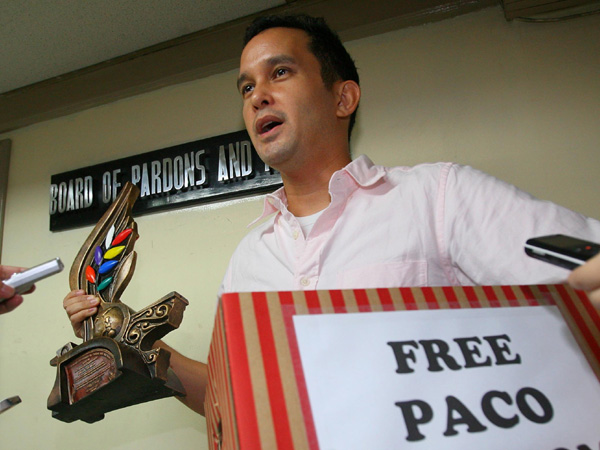Gov’t rejects appeal in high-profile murder case

Award-winning filmmaker Marty Syjuco is responsible for the documentary “Give Up Tomorrow,” about the case of Francisco “Paco” Larrañaga, one of the seven young men convicted in 1999 by a Cebu court for the 1997 killing of two sisters Jacqueline and Marijoy Chiong. INQUIRER/ MARIANNE BERMUDEZ
MANILA, Philippines—The Philippines has rejected an appeal to pardon a Spanish-Filipino serving life in jail for murdering two women despite an award-winning documentary showing his innocence, the film-maker said Monday.
Francisco “Paco” Larrañaga filed an appeal to President Benigno Aquino after the 2011 release of “Give Up Tomorrow” highlighted major flaws in the case and won a series of awards, including one from the Philippine government.
However the Department of Justice rejected the appeal on behalf of the president without giving an explanation, said Marty Syjuco, the producer of the film who is also related by marriage to Larrañaga.
“Everybody was hoping this film would make a difference,” Syjuco told AFP, adding the recent award by the Philippines’ arts and culture commission for “bringing honor to the country” had raised false hopes for Larrañaga.
“On the one hand the Philippine government is saying we have brought honor to the country for highlighting this injustice, yet on the other it is continuing to perpetuate the injustice.”
Article continues after this advertisementLarrañaga, then 19, and six other young men were arrested in 1997 for the rape and murder of two sisters aged in their early 20s in the central city of Cebu. He has been in jail ever since.
Article continues after this advertisementThe gripping documentary, which won the audience award at New York’s Tribeca Film Festival, makes a compelling case that the seven men were framed as part of a conspiracy involving corrupt police and judicial figures.
Dozens of witnesses said Larrañaga was in Manila, the nation’s capital, 550 kilometres (340 miles) away, at the time of the murders. But the judge ignored them, relying instead on one convicted criminal who turned state witness.
The UN Human Rights Commission ruled in 2006 that Larrañaga had been denied due process and cited multiple major flaws in the case against him.
Larrañaga remains in jail in Spain, where he was transferred as part of a prisoner exchange treaty in 2009, while his six Filipino co-accused are behind bars in the Philippines.
The Spanish government has also lobbied the Philippines on behalf of Larrañaga but he cannot be released unless he wins a presidential pardon.
Justice Secretary Leila de Lima did not respond to requests by AFP for comment on why Larranaga’s appeal had been denied.